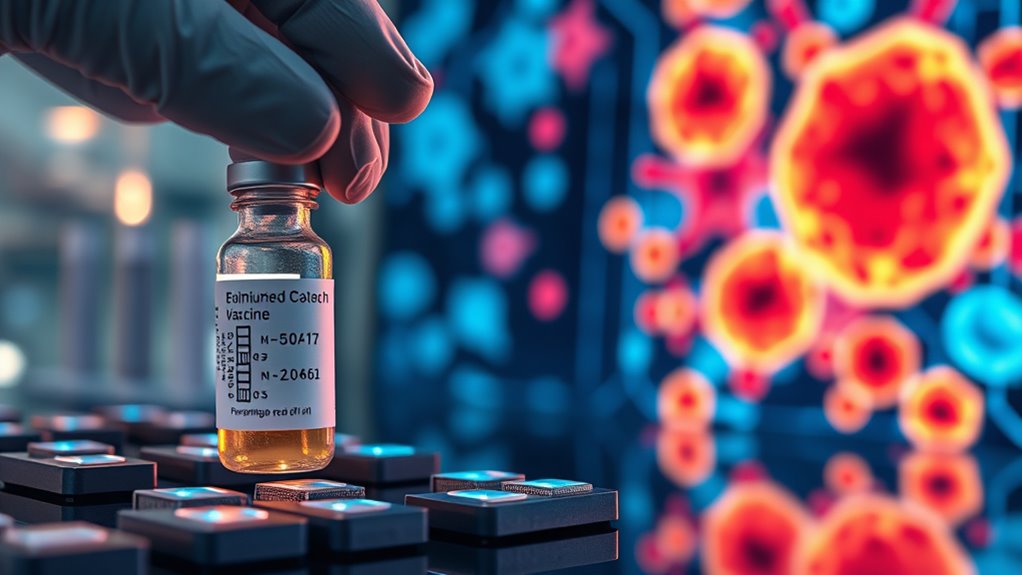A personalized cancer vaccine works by using information from your tumor’s genetic makeup to identify unique mutations called neoantigens. Your immune system is then trained to recognize these specific markers, prompting targeted T-cell attacks that destroy cancer cells while sparing healthy tissue. This tailored approach enhances immune response, reduces side effects, and offers longer-lasting protection. If you want to understand how this innovative therapy trains your immune system so effectively, keep exploring the details.
Key Takeaways
- Personalized vaccines identify and incorporate tumor-specific neoantigens to stimulate targeted immune responses.
- They train immune cells, especially T-cells, to recognize and attack cancer cells effectively.
- Customization enhances immune system recognition, reducing tumor evasion and recurrence.
- Combining vaccines with other immunotherapies amplifies the immune response against tumors.
- Ongoing research aims to improve vaccine design for durable, long-lasting immunity.

Personalized cancer vaccines represent a groundbreaking approach in immunotherapy by tailoring treatments to an individual’s unique tumor profile. This innovation allows you to activate your immune system more effectively against cancer cells, increasing the potential for better outcomes. Unlike traditional therapies, which often target common cancer types with a one-size-fits-all strategy, personalized vaccines are designed based on the specific genetic mutations and antigens present in your tumor. This customization aims to enhance vaccine efficacy by focusing on the unique features of your cancer, making the immune response more targeted and potent.
Personalized cancer vaccines tailor treatment to your tumor’s unique genetic profile for more effective immune response.
When you receive a personalized cancer vaccine, it fundamentally trains your immune system to recognize and attack your tumor cells. The process involves analyzing your tumor’s genetic makeup to identify neoantigens—new protein markers that are specific to your cancer. These neoantigens are then incorporated into the vaccine, which is administered to stimulate your immune response. The goal is to generate a robust attack from immune cells like T-cells, which can seek out and destroy cancer cells more efficiently. Since the vaccine is tailored to your tumor’s unique profile, it can elicit a more precise immune response than traditional approaches, potentially reducing the likelihood of tumor evasion and recurrence.
Vaccine efficacy depends heavily on how well your immune system can recognize and respond to the presented antigens. Personalized vaccines are designed to optimize this process by selecting neoantigens that are highly immunogenic, meaning they provoke a strong immune response. This targeted approach helps guarantee that your immune system isn’t just activated broadly but is specifically directed at the cancer cells, minimizing collateral damage to healthy tissue. As a result, you may experience fewer side effects compared to conventional therapies, which often affect normal cells along with cancerous ones.
The success of personalized vaccines hinges on your immune response being both potent and sustained. Researchers are continually refining vaccine design to improve this response, aiming to produce long-lasting immunity that prevents tumor regrowth. The ability of your immune system to remember and respond to these neoantigens is vital for durable treatment effects. Additionally, combining personalized vaccines with other immunotherapies, like checkpoint inhibitors, can further amplify your immune response, making it more difficult for the tumor to escape immune detection. AI vulnerabilities, such as bias and jailbreak techniques, highlight the importance of ongoing safety assessments in developing these advanced treatments.
Frequently Asked Questions
How Long Does It Take to Develop a Personalized Vaccine?
Developing a personalized vaccine typically takes about 4 to 6 weeks, depending on the vaccine development process and individual patient factors. You can expect a treatment timeline that includes tumor sample collection, genetic analysis, vaccine design, and manufacturing. This rapid process allows for timely treatment, but the exact duration may vary based on the complexity of your specific case. Stay in close contact with your medical team to understand your personalized timeline.
What Are the Potential Side Effects of the Vaccine?
Are you wondering about the potential side effects? You might experience some mild adverse reactions like redness, swelling, or fatigue as your immune response activates. Serious side effects are rare but possible. Do you think the benefits of fighting cancer outweigh these risks? Generally, personalized vaccines are designed to minimize adverse reactions, making them a promising and targeted treatment option that boosts your immune response without significant harm.
How Effective Is the Vaccine for Different Cancer Types?
The vaccine’s effectiveness varies across cancer types, primarily due to tumor specificity and immune activation. For some cancers, like melanoma, it shows promising results by boosting immune responses specifically against tumor cells. However, for others, effectiveness may be limited if the vaccine can’t adequately target unique tumor markers. Overall, its success depends on how well it can activate your immune system and target each tumor’s specific characteristics.
Can the Vaccine Be Combined With Other Treatments?
Yes, you can combine the personalized cancer vaccine with other treatments. Combination strategies often enhance immune synergy, making therapies more effective. For example, pairing the vaccine with checkpoint inhibitors can boost your immune response, helping your body better fight tumors. Always discuss with your healthcare team to tailor the best approach for your specific cancer type, ensuring the treatments work together safely and effectively.
What Is the Cost of Personalized Cancer Vaccine Therapy?
The cost of personalized cancer vaccine therapy varies widely, often ranging from $50,000 to over $100,000 per treatment, depending on the complexity of the case. You should do a thorough cost analysis and check your insurance coverage, as some plans may partially or fully cover the procedure. Keep in mind that costs can differ between providers and regions, so it is crucial to consult with your healthcare team for precise estimates.
Conclusion
Just as Prometheus brought fire to mankind, your immune system now gains a powerful new tool against cancer. This personalized vaccine awakens your body’s natural strength, turning the tide in your favor. Remember, even in the darkest night, the dawn of hope can break through. With this innovation, you’re not just fighting tumors—you’re igniting a revolution within yourself. Embrace this new chapter, knowing that the flame of resilience burns brighter than ever.








